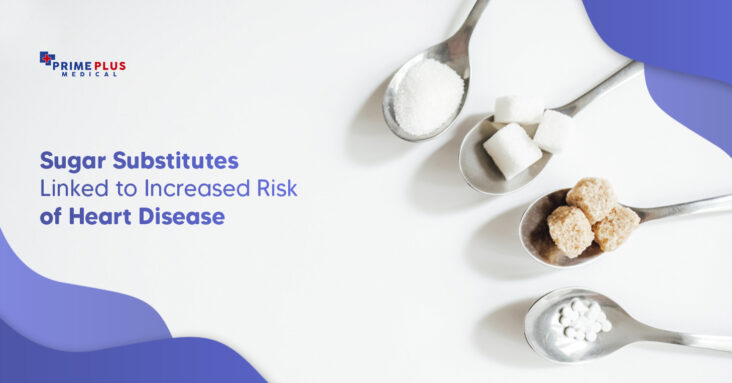Sugar Substitutes Linked to Increased Risk of Heart Disease. Artificial sweeteners are highly popular among people trying to cut calories or lose weight. Unfortunately, replacing your sugary drinks with artificially sweetened ones has not been fully proven to help you lose weight. According to experts, the evidence is mixed.
The bad news does not end there: numerous small studies have hinted that artificial sweeteners may be linked to potential health problems, such as an increased risk of cancer, kidney disease, and cardiovascular disease. And recently, a new large study has suggested that consuming artificial sweeteners is linked to an increased risk of cardiovascular disease.
So, are you one of the people who enjoy a daily diet soda? Do not panic. You might want to make changes related to the artificially sweetened beverages you consume, but first things first. Let’s try to understand the problem at hand.
What one of the largest studies on the subject has found about sugar substitutes
In September 2022, the British Medical Journal (The BMJ) published the results of a study that followed over 100,000 adults for approximately one decade. The study is one of the largest ones ever conducted to identify heart health problems associated with artificial sweeteners.
The result published in the BMJ showed that sugar substitutes are associated with a 9 percent higher risk of cardiovascular disease event and an 18 percent higher chance of stroke. The authors also added that the results of this study indicate that these sugar substitutes consumed daily by millions of people and contained in thousands of foods and beverages are not supposed to be considered a healthy or safe alternative to sugar.
The most problematic sweeteners
The above study has also found that certain health risks were higher with specific sweeteners. For instance, acesulfame potassium (Ace-K), sold under the brand names Sweet One and Sunett, was linked to a 40 percent higher risk of coronary heart disease.
Ace-K is found in soft drinks, protein shakes, candy, gum, baked goods, frozen desserts, and more. In 1998, the US Food and Drug Administration (FDA) approved the use of Ace-K in soft drinks. As a result, the ingredient became more widely consumed by the average person.
Despite the FDA approval for Ace-K (and similar approvals in other countries), there have always been people who questioned its safety. The study published by the BMJ indicates that it is indeed not safe to use acesulfame potassium or Ace-K as an alternative to sugar.
Furthermore, aspartame, sold under the brand names NutraSweet, Equal, and Candeler in various countries worldwide, was associated with a 17 percent greater risk of stroke. And sucralose, sold under the brand name Splenda, was associated with a higher risk of coronary artery disease.
Ace-K, aspartame, sucralose, and several other sugar substitutes are approved by the Food and Drug Administration (FDA), European Food Safety Authority (EFSA), and other similar institutions worldwide, including the Indonesian Food and Drug Authority (BPOM). As for its recommended limit, according to the Harvard T.H. Chan School of Public Health, the daily limits of artificial sweeteners vary by type but are equal to 23 tabletop packets per day.
You may be keen to read Bursitis: Identify Symptoms and Prevention in Early
The takeaway
Though the above study has presented excellent findings, keep in mind that the study was not a controlled experiment designed to prove whether or how artificial sweeteners might directly cause cardiovascular disease events. The findings of this study, like any other observational study, can not prove direct cause and effect. But there is definitely something to learn here. So, what’s the takeaway?
In an article published by Harvard Health Publishing, an adjunct professor in the Department of Nutrition at the Harvard T.H. Chan School of Public Health explained that the above study has provided yet another piece of evidence that artificial sweeteners may not be benign in terms of heart health.
Therefore, it is time to review your diet too! As mentioned earlier, diet sodas (or diet sports drinks, energy drinks, and teas) are the largest source of artificial sweeteners in the diet. So, if your diet tends to involve a serving (or more) of artificially sweetened beverages, we highly recommend you cut back.
Instead, you can fix a drink by adding pure fruit juice to plain sparkling water. That way, you can have a sweet fizzy drink minus the questionable artificial sweetener.
We hope that your 2023 will be filled with healthy lifestyle choices, even when it means making some necessary changes. And if you ever need to consult a GP, our English-speaking team of doctors at Prime Plus Medical in Canggu is ready to assist you 24/7.

